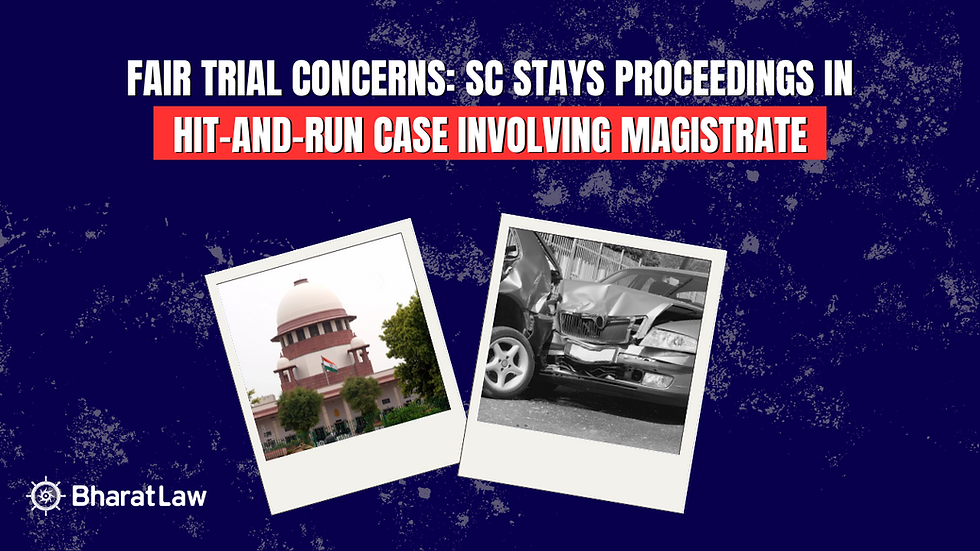Arbitral Awards Should Not Be Interfered With in a Casual and Cavalier Manner: Supreme Court Reaffirms Limited Judicial Review
- Chintan Shah

- Sep 30, 2024
- 4 min read
Summary of the Judgment
Case Name: Punjab State Civil Supplies Corporation Limited & Anr. vs. M/S Sanman Rice Mills & Ors.
Date of Judgment: 27th September 2024
Court: Supreme Court of India
Judges: Hon'ble Justice Pamidighantam Sri Narasimha and Hon'ble Justice Pankaj Mithal
Acts and Sections Discussed: Arbitration and Conciliation Act, 1996 – Sections 34 and 37
Cited Judgements:
Bharat Coking Coal Ltd. v. L.K. Ahuja (2001) 4 SCC 86
Dyna Technology Private Limited v. Crompton Greaves Limited (2019) 20 SCC 1
MMTC Limited v. Vedanta Limited (2019) 4 SCC 163
Konkan Railway Corporation Limited v. Chenab Bridge Project Undertaking (2023) 9 SCC 85
Bombay Slum Redevelopment Corporation Private Limited v. Samir Narain Bhojwani (2024 SCC OnLine SC 1656)
Introduction
In a significant ruling on 27th September 2024, the Supreme Court of India rendered its judgment in the case of Punjab State Civil Supplies Corporation Limited & Anr. v. M/S Sanman Rice Mills & Ors. This case revolved around a dispute concerning an arbitration award, leading to an in-depth analysis of the powers vested under Sections 34 and 37 of the Arbitration and Conciliation Act, 1996. The Hon'ble Justices Pamidighantam Sri Narasimha and Pankaj Mithal presided over the appeal, which ultimately reaffirmed the limited scope of judicial interference in arbitral awards.
Background of the Case
The dispute arose from a contract entered into between the Punjab State Civil Supplies Corporation (hereinafter referred to as "the Corporation") and M/S Sanman Rice Mills (hereinafter referred to as "the Rice Mill") on 6th October 2008. Under this agreement, the Corporation supplied paddy to the Rice Mill, which was to process the paddy into rice and return it to the Corporation. However, a shortfall of 35,110.39 quintals of rice worth ₹7,16,15,716/- was noticed, leading to a financial dispute between the parties.
The matter was referred to arbitration, where the arbitrator awarded a sum of ₹2,67,66,804/- in favour of the Corporation, along with interest at 12% per annum. Dissatisfied with the award, the Rice Mill challenged it under Section 34 of the Arbitration Act. The challenge was dismissed, prompting the Rice Mill to appeal to the High Court under Section 37, where the arbitral award and the order under Section 34 were both set aside. The Corporation then approached the Supreme Court, challenging the High Court’s ruling.
Issues for Consideration
The key legal issue that the Supreme Court was tasked with addressing was whether the appellate court (High Court) had exceeded its powers under Section 37 of the Arbitration and Conciliation Act, 1996, by setting aside the arbitral award, which had already been upheld under Section 34.
Scope of Judicial Intervention in Arbitral Awards
In resolving this dispute, the Supreme Court meticulously examined the limited scope of judicial intervention under Sections 34 and 37 of the Arbitration Act. The Act emphasises minimal interference by courts in arbitral proceedings, with Sections 34 and 37 providing specific grounds for intervention.
1. Section 34:
Section 34 outlines the grounds on which an arbitral award can be set aside, such as when the award is in conflict with the public policy of India or when it is tainted by fraud or corruption. Importantly, it restricts judicial interference by specifying that the courts should not substitute their own views for that of the arbitrator.
2. Section 37:
Section 37 provides for appeals against orders made under Section 34. However, as the Court noted, the scope of appellate powers under Section 37 is analogous to those under Section 34. The appellate court cannot reassess the merits of the award or reappraise evidence as if it were sitting in an appellate review over the arbitral award.
Key Legal Precedents Cited
Several significant judgments were cited by the Supreme Court to elucidate the principles guiding the scope of judicial intervention in arbitral awards.
Bharat Coking Coal Ltd. v. L.K. Ahuja (2001): In this case, the Supreme Court observed:
“There are limitations upon the scope of interference in awards passed by an arbitrator. When the arbitrator has applied his mind to the pleadings and evidence, there is no scope for the court to reappraise the matter as if this were an appeal.”
Dyna Technology Private Limited v. Crompton Greaves Limited (2019): This case reiterated that arbitral awards should not be interfered with unless there is a manifest error that goes to the root of the matter:
“Arbitral awards should not be interfered with in a casual and cavalier manner unless the perversity of the award goes to the root of the matter.”
MMTC Limited v. Vedanta Limited (2019): This judgment highlighted that interference under Section 37 must not extend beyond the confines of Section 34:
"The court cannot undertake an independent assessment of the merits of the award and must only ascertain that the exercise of power by the court under Section 34 has not exceeded the scope of the provision."
Conclusion
The Supreme Court’s judgment in Punjab State Civil Supplies Corporation Limited & Anr. v. M/S Sanman Rice Mills & Ors. serves as a crucial reminder of the restricted scope of judicial review in arbitration cases. By overturning the High Court's decision, the Court reinforced the principle that arbitral awards should be respected and that judicial intervention must remain limited to exceptional circumstances as defined under the Arbitration and Conciliation Act, 1996.
This judgment is a significant reaffirmation of the autonomy of arbitral tribunals and the finality of their awards, underscoring that courts must exercise restraint in interfering with such awards. This ensures that arbitration remains a viable alternative to lengthy litigation, aligned with the legislative intent behind the Arbitration Act.



Comments